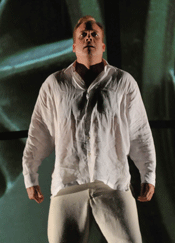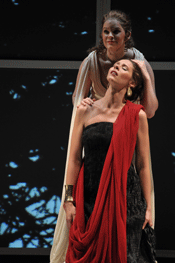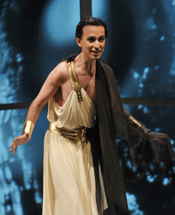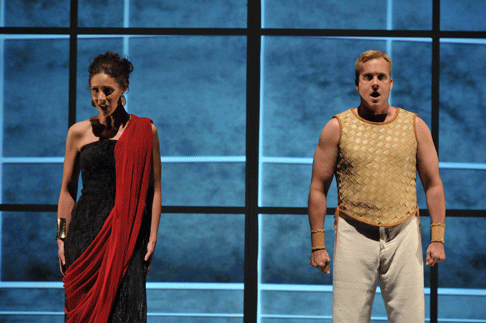06 Jun 2011
Phaedra in Philadelphia
The U.S. premiere of Hans Werner Henze’s Phaedra at the Opera Company of Philadelphia may well be the most important and ambitious new work presented by any American company this season.

The U.S. premiere of Hans Werner Henze’s Phaedra at the Opera Company of Philadelphia may well be the most important and ambitious new work presented by any American company this season.
Henze started composing when Arnold Schoenberg and Richard Strauss were still alive; he is the last living link to a continuous tradition of German opera reaching back for centuries. Yet his Phaedra, composed in 2007 when the composer was in his early 80s, is as vital and moving as any of his dozen previous operas. Presented by a brilliant and committed young cast, it marks a special occasion for any serious music-lover.
Phaedra retells the Greek myth of a step-mother’s fatally incestuous love for her son—a theme that has fascinated playrights from Euripides to O’Neill and composers from Rameau to Britten. Act One in Henze’s libretto follows Euripides. When Hippolytus rejects Phaedra’s love, it turns to hate. She plots his murder, then commits suicide out of shame. In the background, goddesses make sport of men, with Aphrodite goading on Phaedra and Artemis backing Hippolytus. In Henze’s Act Two, drawn loosely on Ovid, Hippolytus is resurrected by Artemis, loses his memory, is imprisoned in a cage and a cave, but in the end regains both freedom and identity.
 William Burden as Hippolytus
William Burden as Hippolytus
The work contains autobiographical resonances. Henze, in the classic mode of German Romantics, moved in later life to Italy—by chance, close to the spot where these mythical events are said to have occurred. He had finished Act One when he suddenly fell into a coma for several months. He was expected to die, but suddenly recovered. Seemingly revitalized, he wrote Act Two, with its theme of reincarnation.
All this is reflected in Henze’s luminous, precisely constructed score. Those familiar with his most famous operas, written in the 1960s when he was engaged in broader social and intellectual causes, will note that the mode of expression here is more private. One encounters neither the intricate and dramatic interactions among the characters in Elegy for Young Lovers, nor the symphonic sweep and struggle with implacable fate before a Greek chorus of Die Bassariden. The characters in Phaedra barely take notice of one another or the society around them. The dramatic focus lies instead on their interior monologues.
Consistent with its private, existential emphasis, Phaedra is delicately scored for five singers and an orchestra of 23 players. Yet it is miraculously varied, evocative and often sensuous writing of a mature master. The style is influenced, as always with Henze, by the second Viennese school—one key reference being Alban Berg’s Lulu—with clearly audible elements of Schönberg’s serialism, Stravinsky’s neo-classicism, Britten’s sound-world, and Weill.
 Elizabeth Reiter (standing) as Aphrodite with mezzo-soprano Tamara Mumford (kneeling) as Phaedra
Elizabeth Reiter (standing) as Aphrodite with mezzo-soprano Tamara Mumford (kneeling) as Phaedra
Henze makes this all distinctively his own, creating unforgettable moments. Phaedra and Hippolytus’s early dawn wanderings in the forest are introduced by a sinuous duet for alto saxophone and English horn. The apex of the opera, when Hippolytus questions his identity, is followed by the most magically subtle suggestion of an orchestral storm: a brooding cello, swirling woodwinds, and a light, almost Japanese, rainstorm of solo percussion. The final scene, expressing the moral that we should dance our way through life rather than hunting (or being hunted) in the labyrinth, wittily echoes the finales of classic Baroque or Mozart opera.
Such writing imposes enormous technical and interpretive demands. Complex, largely atonal passages, subtle shifts in dynamics and meter, and a wide range of refined timbres must be performed in a limpid and fluid manner.
In Philadelphia, four outstanding young American singers take the leads. Phaedra is movingly sung by young mezzo-soprano Tamara Mumford. Her uncommonly expressive voice has increased in size since her successful Lucretia in Philadelphia two years ago—almost to the limits of the role—yet retains its plangent edge. Her elegant physical beauty perfectly suits aristocratic women in uncomfortable circumstances, such as Lucretia and Phaedra.
 Anthony Roth Costanzo as Artemis
Anthony Roth Costanzo as Artemis
Anthony Roth Costanzo, the leading American countertenor of his generation, assumes the role of Artemis with clarity, precision and occasionally seductive charm. His voice has also grown in recent years, perhaps—as with Mumford—the result of singing at the Met.
William Burden, another returnee from the 2009 Lucretia, sings Hippolytus with passion, musicality, and dramatic impact. To be sure, some might object that the role of Hippolytus calls for less virility and a cooler and more focused tone production—John Mark Ainsley sang the European premiere to perfection—but Burden slims down to a ravishing “mixed voice” when it matters most, as in the Act II scene starting “Bin ich ein Vogel…”
Henze’s meandering, atonal phrases are murderously difficult to sing precisely on pitch. Only Elizabeth Reiter, who sings Aphrodite, is fully up to the task (though Costanzo comes close). Singing spot on pitch, she brings the music suddenly into focus, revealing its Mozartian naturalness and grace. It is hard to believe Reiter is a still a graduate student at Curtis—albeit one already boasting Tanglewood, Carnegie Hall, and European credits. Jeremy Milner is vocally and physically imposing in the cameo role of the Minotaur.
For all the vocal splendor—reinforced by the small confines of the Kimmel Center’s Perelman Theater—the musical preparation is not uniformly idiomatic. Both singers and orchestral players might take fuller advantage of extensive dynamic markings in the score. And only Costanzo consistently communicates of the eclectic pedigree of this music: where, for example, are the Cabaret influences in Phaedra’s Weill-inspired Act II seduction scene? German diction, though uniformly intelligible, remains uneven. Vocal trills go missing. Some questionable orchestral intonation mars Act II, and orchestral detail under Music Director Corrado Rovaris is lost. Yet such issues may resolve themselves out during the 5-performance run of what is an extremely difficult work.
 Tamara Mumford as Phaedra with tenor William Burden as Hippolytus
Tamara Mumford as Phaedra with tenor William Burden as Hippolytus
A more serious problem is that the visual treatment falls well short of the high musical standard. The basic concept of the production is promising: abstract, geometrical panels on which projections appear and in front of which a large cage descends in Act Two to entrap Hippolytus. Yet the costumes, make-up and stage direction fail to capture the mysterious essence of this opera. In part this is because much of the production does not engage Henze’s explicit instructions. One would never know that in the finale of Act One, Henze’s score brutally confronts the audience with Phaedra’s death: “The bang of a trap door. Phaedra hangs from a rope.” In the final scene of Act Two, the stage directions read: “In the background, the Minotaur dances,” evoking the archaic strangeness of the libretto, as well as its aspiration to reconceive two millennia of the Western tradition.
Such instructions need not be followed to the letter, but the lowest-common-denominator realism of the Philadelphia staging—characters in realistic costumes, little make-up and no masks, with pictures of birds and trees behind them—seems banal and earthbound in a way fundamentally at odds with the opera’s spirit. Expressionism or abstraction might better convey that Henze’s characters are not, in the end, real people, but archetypes engaged with central issues of Western culture.
Ultimately, however, the Opera Company of Philadelphia has rightly chosen to emphasize first and foremost the music. Phaedra is a miraculous musical achievement that combines the freshness of youth with the wisdom and skill of old age. An opportunity to hear voices of this quality in a work of this significance should not be missed.
Andrew Moravcsik